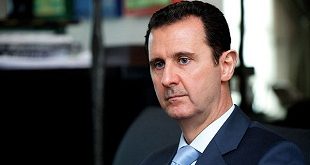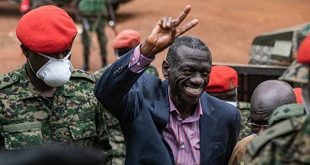
Lessons from Aronda, Muntu, Muhoozi promotions
ANALYSIS | HAGGAI MATSIKO & IVAN RUGAMBWA | Recent promotions in the army have re-ignited the continuous debate of how President Yoweri Museveni uses the forces to stay in power. Hundreds of low rank officers, from 2nd Lieutenant to Major, were in May promoted in a swoop, one of the biggest in the army’s history.
The promotions happened amidst reports of mass desertions over allegations of low and intermittent payment. UPDF salaries start as low as Shs310, 000 (Approx. US$125) and are paid irregularly.
As usual, the attention is fixed on “westerners eating” but the manner in why President Yoweri Museveni promoted Education minister Jessica Alupo has also become a talking point.
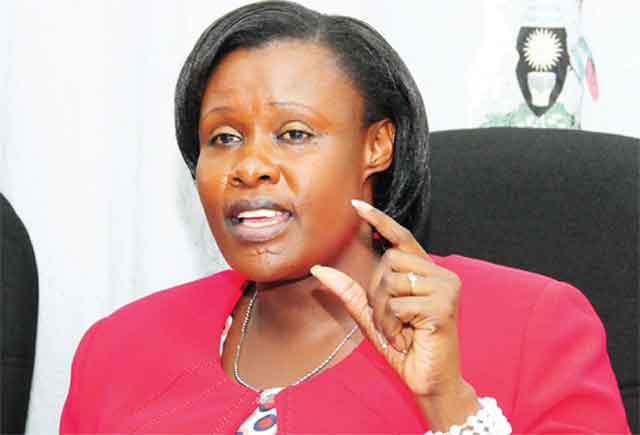
In January this year, during the National Resistance Movement (NRM) retreat at National Leadership Institute in Kyankwanzi, promoted Alupo to the rank of Major.
Alupo, who retired from the army in the early 2000s, was donning her pips of a Captain; a very junior rank in the army, when Museveni spotted her.
“How can a minister be a captain?” a surprised Museveni reportedly asked her. The next morning, Alupo turned up as a Major.
Alupo’s new rank did not make headlines but it sparked quiet debate in army circles as officers expressed ire over how President Museveni invokes his prerogative in promoting soldiers.
Allegations of favouritism are being made against President Yoweri Museveni and his commanders.
Most of the complaints are made off the record because soldiers are punished for speaking to the press.
Promotions in the UPDF are supposed to be regulated by the UPDF Act and Regulations- Conditions of Service for officers (CS-O).
Regulation 25 (1) of the CS-O notes that “the promotion of an officer shall be recommended by the commanding officer, and the recommendations shall be considered by the Commissions and Promotions Board on three different occasions and shall be within service brackets…”
Under this regulation, an officer can only become a Lieutenant after 12 months of commissioned service, a Captain after five to six years, a Major after 11 to 13 years, and a Lieutenant Colonel after 18 to 20 years, Colonel, after 21 to 23 years.
Sub regulation (2), however, notes that exceptional circumstances may be considered. But being a minister at a rank of Captain cannot be one of the exceptional circumstances envisaged by this law, those querying Alupo’s rank say.
Besides, promotions between Lieutenant and Colonel are according to the law, a docket of the commanding officer and the promotions board and not the Commander in Chief (CiC).
President Museveni, who is the CiC, deals only with promotions of officers above the rank of Colonel on the advice of the High Command.
Irregular promotions
Currently, whenever army promotions are mentioned, the President’s son, Special Forces commander Brig. Muhoozi Kainerugaba, tops the list.
But Maj. John Kazoora who was with Museveni in the bush war but has remained on the same rank that he was given in 1988 says the irregularities in army promotions are part of Museveni’s hidden weapon for clinging to power using different characters at different stages.
“When Museveni wants to use you,” Kazoora says, “you will get catapulted to any level.”
Amanya Mushega, who also fought in the bush with Museveni, says the arbitrary rapid promotions are part of a system with no accountability mechanisms seen in many other sectors of Museveni’s government.
Comments by renegade Gen. David Tinyefuza, who is in exile in London, have become fodder for President Museveni’s critics, who argue that the president is grooming Muhoozi as his successor.
Tinyefuza pushed these allegations a notch higher by claiming that President Museveni plans to assassinate top officials who oppose Muhoozi.
Muhoozi, who joined as a Cadet Officer in 1999 was commissioned as Second Lieutenant in 2000, became a Major in 2003; Lt. Col in 2008; and Brigadier General in 2012.
In brief, it took Muhoozi just 12 years of commissioned service to become a Brigadier.
As the fires over the succession debate raged, President Museveni on May 24 shuffled the army command. Claims are being made that he was clearing the way for Muhoozi since the changes left him as the lone left-over from the 1980s historical leaders of the army.
The so-called “bush war heroes” like Tinyefuza apparently have had a hard time saluting their new bosses.
Gen. Aronda Nyakairima, then-Chief of Defence Forces (CDF) and his deputy, Lt. General Ivan Koreta who were removed were the last of this thread in UPDF leadership.
Aronda is currently the Internal Affairs Minister as Koreta awaits his posting as an Ambassador. But these two officers capture best the impact of rapid promotions under Museveni.
Army officers that have been rapidly promoted
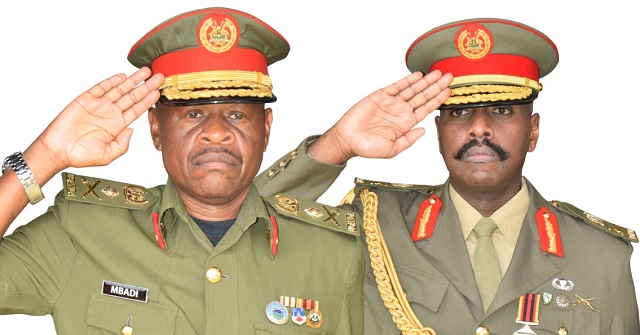
Kainerugaba
Old rivalries
In 1988, when formal ranks were introduced, Aronda was just a Lieutenant and Koreta five high ranks ahead as Brigadier General. Aronda, was commissioned as a Lieutenant in 1988, got promoted to Captain the same year. It took him seven years to become a Major that is in 1995. But from here, Aronda was getting promoted almost every two years.
By 2003 Koreta had been promoted just once to Major General while Aronda had been promoted seven times to attain the same rank. By 2005 Aronda had overtaken Koreta to become General while Koreta remained stuck at Lt. General.
Koreta, who started his military career training in Mozambique in the 1970s, participated in the Front for National Salvation (FRONASA) and was one of the top commanders in the bush, now, had to salute Aronda, who joined the struggle in 1982.
It had taken him just 10 years to cut through seven ranks becoming a General in 2005, according to his biography at the United States Army Combined Arms Center, Fort Leavenworth, Kansas where he trained.
While it should take one up to 20 years of commissioned service to become a Lt. Colonel, in just 17 years of commissioned service, Aronda had become a full star General—the only General amongst those who joined the army with him.
Aronda, UPDF insiders say, benefited from rapid promotions because he was politically correct; very quiet and disciplined.
Despite doing the topmost military course, and being one of the most senior officers in Uganda, Koreta did not make it to the exclusive club of full star Generals.
Prominent officers like Col. Fred Mwesigye, MP Nyabushozi County, Col. Ahmed Kashillingi, Col. Julius Kihandae have also remained languishing in lower ranks as young cadres zoom past them. Ironically, these are among the original 27 officers that launched the 1980s bush war that brought Museveni to power.
The Commandant Land Forces, Hussein Ada, who has served the army since the time of the Kings African Riffles, before Uganda got independence, remains a Brigadier and has to salute much younger officers like David Muhoozi, who is now his boss.
Loyalists favoured
In the latest debate, it’s the historical complaint that Museveni and army confidants only promote their favourites has surfaced.
The case of Museveni’s former Aide de Camp (ADC), Wilson Mbadi, is mentioned. He was promoted from Colonel to Brigadier in September 2012 and seven months later to Major General in May 2013 and made the new Joint Chief of Staff (JCOS).
A part from his rapid rise, Mbadi as JCOS is a top boss that even those with the same rank as him salute him.
Sometimes the transition becomes difficult even for those promoted. Take the case of Joseph Semwanga, the former Colonel who was promoted to Brigadier, and handed the command of the Armored Brigade in Masaka.
Sources in the UPDF told The Independent that on the eve of the Heroes Day celebrations on June.9, Brig. Semwanga, who had just been promoted had a hard time greeting officers much senior than him that now had to salute him.
Semwanga joined the army in 1995, was commissioned in 1997, and has taken only 15 years to become a Brigadier.
In the same reshuffle, Inspector General of Police, Kale Kayihura, formerly a Lt.General became a full General. But it has not always been rosy for Gen. Kayihura.
During the 1990s as the Arondas were being promoted, Kayihura was left behind yet he had joined the bush around the same time with them and had the same or even better academic qualifications.
Kayihura’s world has since changed, for crushing opposition protests, President Museveni has often praised him, and ranks have come swiftly. After his recent promotion to four-star general he could bare hide his excitement as he walked ahead of a procession led by the police brass band in celebration on the streets of Kampala and held a party to celebrate his new rank.
In the same promotions, General Katumba Wamala, who as a Lt. General headed the Land Forces was promoted to General and emerged the new CDF.
Promoted to Major General, Charles Angina, became his deputy. David Muhoozi was promoted to Major General and took over Katumba’s former docket, the Land Forces.
Brig. Leopold Kyanda became the Chief of Staff Land Forces, a position formerly held by Angina.
Fights over promotion have plagued the army since the bush war days of 1981- 86. In 2003, a UPDF High Command probe committee was established to investigate irregularities in the promotions.
Just four years ago, in August 2009, then-head of opposition Uganda Peoples Congress party’s Communication Department, Benson Ogwang Echonga, and a group of lawyers petitioned the Constitutional Court to declare ethnic-based promotions unconstitutional.
Until recently, all generals; Museveni, Saleh, Tinyefuza, Aronda, and Tumwine, were from the same ethnic group.
Aronda, while defending the promotions told the Constitutional Court that the named officers had rich military experience dating back to the early 1970s, including participation and leadership in the FRONASA through the 1981liberation struggle.
But Aronda himself was never in FRONASA.
While Tumwine, Saleh, Tinyefuza and Aronda had done the Staff and Command College Course, the second highest level of training in the army, there were a lot of UPDF officers who had done the highest military course, the National Defence College Course.
Among these were Wamala, a one Col. Hudson Mukasa, Jeje Odong, then still a Lt. General and Koreta among others.
The most cited example of Museveni favouritism in the past involved the late Brig. Noble Mayombo, who attained that rank in 2005.
Mayombo had helped in crushing opponents like former opposition leader Kizza Besigye, who once confessed that Mayombo “used to harass” him.
President Museveni also promoted to Maj. Gen. Mugisha Muntu, the current president of the opposition Forum for Democratic Change (FDC) party and made him Army Commander at 29 years of age.
Another example is the late Maj. Gen. James Kazini. At the time Kazini commanded the UPDF, although he had cut his teeth as a fierce soldier, he was not the most qualified.
Kazini replaced Gen. Jeje Odongo who had replaced Muntu in 1998.
His swift ascendance to the top UPDF job was attributed largely to his closeness to Museveni’s younger brother, the decorated bush war fighter, Gen. Caleb Akandwanaho aka Salim Saleh—who even back then called the shots in the army.
Kazini was poorly educated and clashed with elite soldiers but was very close to Saleh having served as his bodyguard.
Army officers whose promotion has been slow
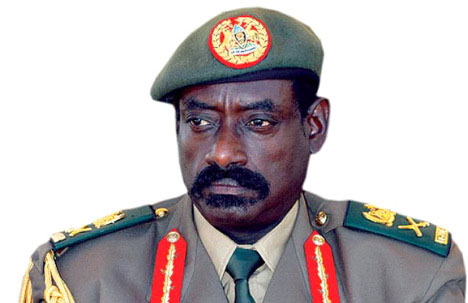
Bush war anger
In his latest complaints, Tinyefuza also alleged that Museveni refuses to retire senior UPDF officers because he fears they could challenge him in the political arena.
Tinyefuza wrote: “Imagine 70-year olds who joined the army before some of us started school still serving and on the army pay roll…,” Tinyefuza wrote, “…Retire us and Spare us the humiliation of having to salute our grandchildren…”
But irked by Tinyefuza’s letter, Brig. Steven Kashaka, a celebrated bush war fighter who joined the revolution in the days of FRONASA, shot back.
“Talking about rapid promotions and parachutes, you were the first beneficially and it could not stop with you,” he told Tinyefuza.
Kashaka wrote: “During the bush war, in 1981while I was commanding Lutta Unit and you commanding Kabalega Unit, you were parachuted to the rank of Member of High Command equivalent to Brigadier while some of us …who had done a one year O/CDT course at Monduli, commissioned as LTs and also commanded UNLA Units were made Senior Officers equivalent of Major and none of us complained or deserted…”
Kashaka’s comments resurrected controversy over promotions, traced to the bush days that reached fever pitch when formal ranks were introduced in 1988.
The ranks, which left many officials rattled, were arrived at following the sitting of a committee that included the President’s brother, Salim Saleh, the Late Fred Rwigyema and then army commander, Gen. Elly Tumwine.
While Museveni became Lt. General, Elly Tumwine, Saleh and Rwigyema became Major Generals. David Tinyefuza, the Late Tadeo Kanyankole and Matayo Kyaligonza became Brigadiers and Jerome Mugume, Julius Chihandae, and Pecos Kutesa became Colonels.
The Late Eliya Kategaya, the defacto number two to President Museveni got a honorary Brigadier. This did not go down well with him but he complained quietly.
Not Matayo Kyaligonza. Kyaligonza, who is still the only member of the High Command at the rank of Major General, could not hide his disappointment.
He reportedly said he deserved the same rank as Saleh and Tumwine. At some point Kyaligonza was even stripped of the Brigadier rank before it was later reinstated.
Maj. John Kazoora, also a bush war veteran records the several officers’ disappointment at the army ranks, in his book, `Betrayed by My Leader’.
Mushega, who had been a National Political Commissar, became a Major. The late Jet Mwebaze refused to wear army uniform because he was made a mere Captain.
Jim Muhwezi, who was made a Lt. Colonel also declined to wear the uniform arguing that he should have received the same rank as Tinyefuza, who he had the same law qualifications, had trained together in the police with and joined the NRA war the same day.
Muhwezi would later put on the uniform when he became a Brigadier and Mwebaze when he became a Major.
Even in the bush, Muhwezi had issues with Tinyefuza becoming a member of the High Command while he was left out.
As the debate over promotions rages, Mushega advises Museveni and others to develop a tradition of retirement from public service. “For example what is Tumwine [Elly Tumwine] still doing in the army?” Mushega asks, “He was once Army Commander, the highest rank in the force, so what more does he want?”
 The Independent Uganda: You get the Truth we Pay the Price
The Independent Uganda: You get the Truth we Pay the Price
